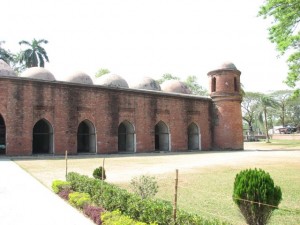Earth Sciences124
-

Done in Khulna, back to Dhaka and then home
On Saturday, we finished up work at the site. Even at the last minute, it threw some challenges at us. We began the day with out reduced group eating breakfast down the street. We could no longer take the mediocre food at the hotel. Dhiman and Babu had been eating there for days. Besides paratha,…
-

Finishing up in Khulna
The last two days have been a little different as I spent much of them in Khulna rather than at the site. Since the Islam family does not have electricity, Hafizul would have to carry the expensive EDM (Electronic Distance Meter) and laptop back and forth to Khulna University to charge. However, we have an…
-

Climate News Roundup: Week of 3/06
NASA Reels From Climate Science Setbacks, AFP, Mar. 6 NASA’s $424 million Glory satellite, meant to monitor aerosols and solar radiation, crashed into the Pacific last week. Climate scientists were relying on the satellite data to fill critical information gaps. The accident comes at an inopportune time, as Congress is in the process of determining…
-

Finally getting it right
We are driving back to Khulna at 10:30 after our third excellent day in a row. However, there were still a lot of hiccups along the way. Yesterday, we were set to install the deep well, but when we arrived they were just starting to pull the pipe from the deep well. We had hoped…
-

Frustration and Progress, again
Days here seem to be coming in pairs. In the morning, we redid the 40m well, remeasuring, doing a dry run with no cement, mixing and putting in cement, lowering the fiber and everything went as planned. Then came the 60m well. It already had a history. It caved in twice when they pulled the…
-

At Bhandarkote, Khulna, the second site
Today we started working on the new site. Bhandarkote is a small village outside of Khulna, the third largest city in Bangladesh. The site is on a dirt road at the family home of a student from Khulna University. It a pretty remote rural place about 25 minutes off the main road through small country…
-

Disaster and moving on
It looks like we lost the deep well. The morning started off as planned. We would finish the calibration of the strainmeters, installing the GPS and training Shaheen for the weekly measurements. Should be out by noon for the 8-hour drive to Dhaka followed b the 5 hour ride to Khulna the next day. Then…
-

Finishing up in Jamalganj
Our time in Jamalganj is coming to a close. We will miss the people here, all of whom have been incredibly helpful. Moktar and Anowar, who constructed the concrete pillars; Aziz the caretaker, locally known as the chief of Jamalganj for his ability to get things done; his son, Shaheen, who will be making the…
-

Up (roofs) and Down (wells)
Today went a lot better than yesterday. Just as well that I forgot my camera so that there are fewer pictures to document it. We said goodbye to Nano, Humayun and Ellie as they went back to Dhaka. Their extra hands helped a lot. And Ellie was a big attraction for all the kids. Adults,…

By studying thousands of buildings and analyzing their electricity use, Columbia Climate School Dean Alexis Abramson has been able to uncover ways to significantly cut energy consumption and emissions. Watch the Video: “Engineering a Cooler Future Through Smarter Buildings“
